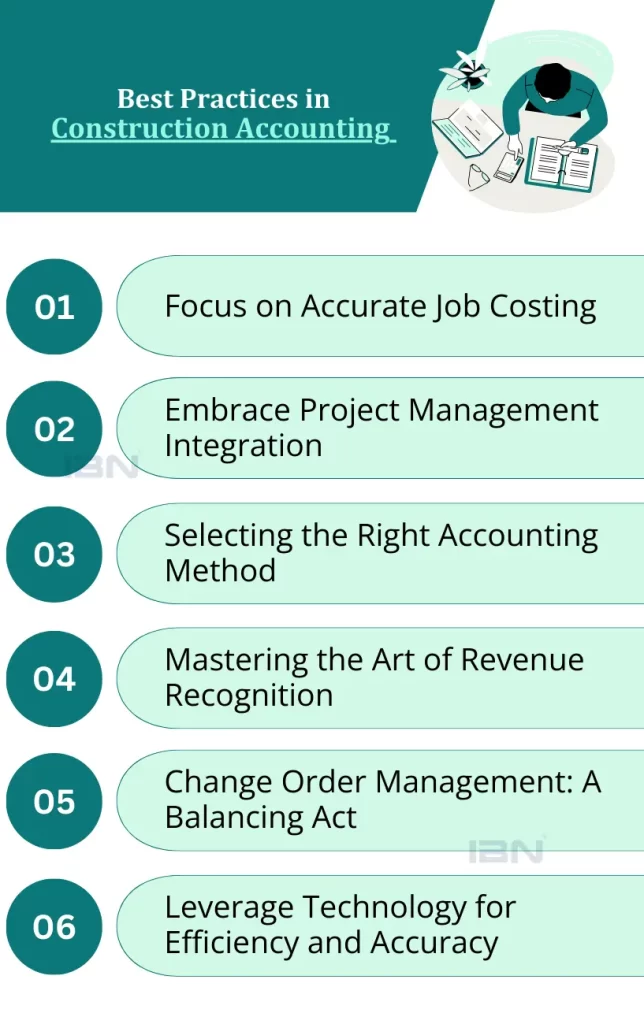The Benefits of Hiring Experts in Construction Accounting for Your Business
The Benefits of Hiring Experts in Construction Accounting for Your Business
Blog Article
Understanding the Relevance of Building Accounting for Effective Project Administration

Role of Building And Construction Accountancy
Building audit functions as the backbone of economic monitoring in the construction industry, ensuring that tasks are completed within budget plan and monetary goals are satisfied. construction accounting. This customized audit technique addresses the special difficulties faced in construction jobs, including differing job periods, rising and fall expenses, and several stakeholders
One of the main functions of building and construction accountancy is to offer accurate price estimation and tracking throughout the job lifecycle. This facilitates informed decision-making, enabling task supervisors to readjust timelines and sources successfully. Additionally, construction audit boosts capital management by monitoring accounts receivable and payable, thus guaranteeing that funds are offered for prompt settlements to distributors and subcontractors.
It gears up project managers with the needed financial information to prepare comprehensive economic statements, which are vital for audits and economic reviews. Inevitably, the duty of building and construction bookkeeping expands past simple financial monitoring; it is indispensable to tactical planning and functional effectiveness, driving the success of construction projects in a competitive landscape.
Trick Components of Building And Construction Bookkeeping

Budgeting develops a financial framework that guides project implementation, enabling supervisors to allot sources successfully and anticipate potential monetary challenges. Accurate expense monitoring is essential for monitoring expenditures in real-time, assisting to recognize variations in between projected and actual prices. This makes it possible for prompt modifications to keep the task on budget.
In addition, economic coverage supplies stakeholders with a clear photo of the project's financial health. Routine reports, such as earnings and loss statements and cash money flow analyses, assist in informed decision-making and improve openness among all events included.
Additionally, compliance with sector laws and accountancy criteria is essential. This makes sure that financial techniques are not only effective yet likewise authorized, protecting the company versus legal repercussions. By integrating these key components, building audit fosters a structured strategy to handling funds, eventually adding to the effective completion of construction tasks.
Benefits for Project Managers
Leveraging reliable building accounting methods provides task managers with a plethora of benefits that enhance both functional efficiency and monetary oversight. One substantial advantage is improved budget management. Exact tracking of expenses and revenues allows project managers to keep an eye on monetary efficiency in real time, ensuring projects continue to be within budget plan and promoting timely adjustments when necessary.
Additionally, construction accountancy enhances capital management, allowing project supervisors to optimize and expect economic demands resource allowance. By comprehending cash inflows and discharges, they can much better handle settlements to providers, workers, and subcontractors, consequently preventing expensive delays.
Furthermore, durable accounting systems provide thorough coverage capabilities. Job supervisors can produce records that use insights right into task productivity, cost differences, and source utilization. This data-driven technique cultivates notified decision-making, permitting managers to determine potential concerns proactively and carry out rehabilitative steps.
Lastly, adherence to building and construction audit criteria ensures compliance with legal and regulative needs, lessening the threat of disagreements or fines. Generally, effective construction bookkeeping equips job supervisors with the devices essential to drive task success, enhance stakeholder confidence, and advertise lasting organizational growth.
Common Difficulties in Construction Accountancy
Lots of job supervisors encounter significant challenges in construction bookkeeping that can prevent project success. Among the key challenges is the intricacy of tracking multiple task websites, each with unique spending plans, timelines, and resource allocations. This requires meticulous attention to information, which can be frustrating without a robust accountancy system in area.
Additionally, changing material prices and labor rates can complicate spending over here plan administration, making exact projecting challenging. Project managers typically have a hard time to integrate these prices with real expenses, bring about possible monetary inconsistencies.
In addition, building and construction bookkeeping includes conformity with various policies, including tax obligations and labor legislations. Navigating these rules can be complicated, particularly for managers who might not have a solid audit background.
An additional significant obstacle is managing capital, which is crucial in the construction sector. Delays in invoicing, settlements from customers, or unanticipated task adjustments can develop capital lacks, jeopardizing the task's development.
Finally, efficient communication in useful site between project supervisors, accountants, and area teams is essential. Misconceptions can cause inaccurate monetary reporting, additionally making complex job monitoring efforts. Dealing with these challenges proactively is essential for effective building audit.

Finest Practices for Effective Bookkeeping
While browsing the complexities of building accountancy can be daunting, adopting best methods can dramatically improve economic management and job success. One fundamental practice is maintaining timely and exact documents. Implementing durable accountancy software customized to construction tasks can streamline data entrance, invoicing, and reporting, lowering errors and saving time.
In addition, developing a clear budget and regular surveillance versus this budget plan are essential. Employing a system of periodic financial evaluations enables job managers to determine variations early, helping with prompt decision-making. It is also important to different project costs right into direct and indirect classifications, allowing clearer understandings right into productivity.
Another finest method involves fostering open interaction amongst all stakeholders. Normal updates and joint discussions regarding financial condition can make certain everybody is aligned and informed. Educating staff in construction-specific accountancy concepts further enhances competency and accuracy.
Finally, making sure conformity with relevant audit standards and policies is non-negotiable. Routine audits and interior reviews add to transparency and liability, constructing depend on with clients and stakeholders. By concentrating on these ideal techniques, construction companies can enhance their audit procedures, ultimately driving job success and monetary security.
Verdict
Finally, construction audit plays an essential duty like this in ensuring effective project management by promoting exact economic oversight and improving decision-making. By integrating essential elements such as expense evaluation, money flow monitoring, and compliance, task supervisors can navigate common obstacles and utilize finest techniques for reliable audit. Eventually, a durable building audit framework not only safeguards budget plan honesty yet additionally adds to the total monetary wellness of construction projects, cultivating lasting success within the market.
By incorporating these key components, construction accounting fosters an organized strategy to handling economic resources, inevitably adding to the successful conclusion of building and construction tasks.
Precise tracking of profits and expenses allows project managers to check monetary performance in actual time, making certain projects remain within spending plan and helping with timely modifications when essential.
Project supervisors can generate reports that supply understandings right into project profitability, price variances, and source utilization.Many project supervisors run into considerable difficulties in building and construction accounting that can hinder task success. construction accounting. Inevitably, a robust building accountancy framework not just safeguards spending plan integrity yet also adds to the total monetary health and wellness of building and construction projects, fostering lasting success within the industry
Report this page